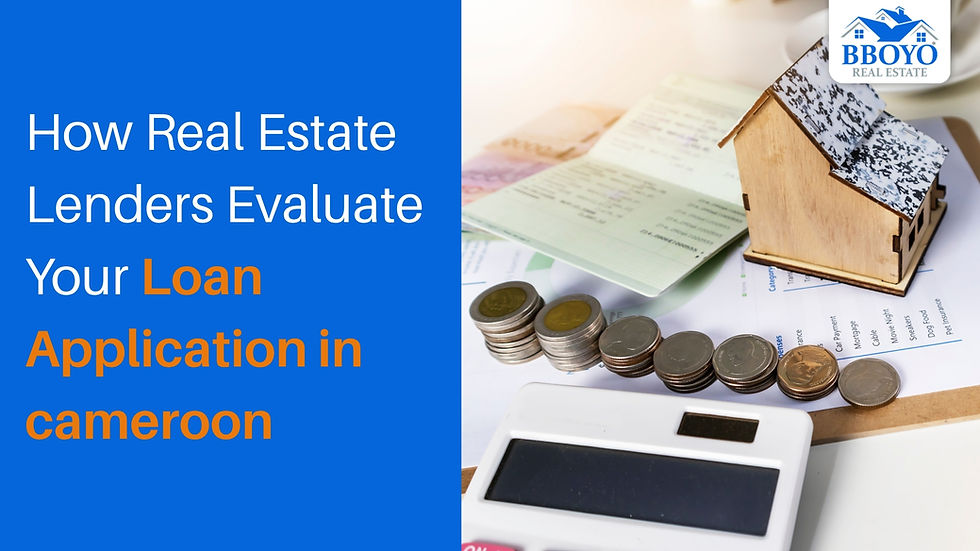How Real Estate Lenders Evaluate Your Loan Application in Cameroon
- Sakshi Pareek
- Oct 10, 2025
- 5 min read

Many families, the diaspora, and young professionals all dream of acquiring a property in Cameroon. However, as it stands, the procedure is usually so intimidating. The process of buying land becomes a nightmare if the buyers have to check land titles, evade common scams, and have the correct paperwork. Undoubtedly, even confident buyers get anxious when it comes to whether their credit request is granted or not.
In the cities of Douala, Yaoundé, and Bamenda, where land and home sellers are struggling to meet the needs of the market, there are always so many applications for loans. It is, therefore, very crucial for the lenders to check all over the applicants' profiles before they even think of giving an approval. You will be the one benefiting if you understand what the lenders expect and you get ready for it.
This is an informative pamphlet that discloses what the real consideration factors are for the Real Estate Lenders in Cameroon and the tips they give on your eligibility for approval.
Understanding the Role of Real Estate Lenders in Cameroon
As far as they are concerned, Real Estate Lenders will have to make sure of the safety of both the property as well as the borrower before giving out the money. They're not just issuing the credits, but they're checking the clearness of the title, the borrower's ability to pay back the loan, and whether the risks are manageable.
For many first-time homebuyers, this may scare them; however, it becomes more predictable once they grasp what is expected.
Key Documents Required for a Loan Application
The collection of necessary documents is the area where most of the loan applicants face difficulties. Here is a list of what banks and Cameroon mortgage lenders generally ask for:
Have a valid ID, a national one, and a passport if you are a diaspora buyer.
Justify your revenue by presenting your last three payslips, an employment contract, business registration, etc.
Property-related documents basically consist of the land title, the survey plan, and tax clearance.
Accounts that show the financial stability of the applicant.
Any missing or disputed documents, such as the emergence of a family claim on land in the village, can hold up your property loan application Cameroon.
How Your Credit History Affects Loan Approval
Credit investigations are still in their infancy in Cameroon. However, lenders do look for the repayment records of the borrowers. Unpaid debts with microfinance institutions and a history of bounced cheques may lower your chances of getting a loan in Cameroon.
The foreign credit reports that are accessed by the lenders, or they may depend on the security that you have for the loan, are what they take into account, in case you are a diaspora investor. Not only is a clean record a factor that could accelerate the loan's approval, but it can also be a leverage for the borrower to negotiate better terms.
The Importance of Your Income and Employment Verification
Steady income is one of the strongest signs of repayment ability. Those who work for a company and have a good salary usually have the mortgage approval process Cameroon. However, the self-employed and small-business owners should submit tax returns or financial statements to the tax authorities as proof of income.
If you are, for example, a seasonal trader in Mfoundi and your income is not constant, it will be very beneficial for you to show your savings history or some other sources of income.
Debt-to-Income Ratio: What Lenders Look For
Lenders are going to relate your income for every month to all your existing debts. If already more than a third of your earnings are utilized for loan payments, then your application will be weakened.
For instance, if you are making 300,000 FCFA a month, but you are servicing debts worth 120,000 FCFA per month, lenders may say no to your application. The key to loan eligibility Cameroon is having a low debt-to-income ratio.
Property Appraisal and Its Role in Loan Evaluation
Even if all your paperwork is complete, lenders will still demand an assessment of the property before they give you the loan. A professional evaluation entails:
Market value compared to the price the property is being sold for.
Physical condition of the property.
Legal clarity of the title.
This property loan evaluation Cameroon guarantees that the lenders are not giving funds to plots of land that are way above the market price or houses that have hidden defects.
Understanding the Loan-to-Value (LTV) Ratio in Cameroon
The real estate loan process Cameroon normally applies the LTV ratio. This metric shows how much you aim to borrow against the real estate's appraisal value.
Let's say a house is valued at 50 million FCFA, and you apply for a loan of 45 million FCFA; the loan-to-value will be 90%. Most banks consider safety LTV ratios in the 70-80% range.
The Impact of Down Payments on Loan Approval
A large down payment is a sign of commitment. In the majority of banks in Cameroon, buyers are required to bring in not less than 20-30% of the property's value.
Suppose you are purchasing land in Buea worth 20 million FCFA; then you should be able to come up with 5-6 million FCFA on the spot. Besides lightening the loan burden, this contribution also lets banks know that you're really committed.
How Lenders Assess Risk Before Approving a Loan
Lenders look beyond just the figures to the risk involved. They consider:
Borrower stability: job duration, immigration status for the diaspora, and family relations.
Property risks: the location, popularity of the market, and any impending tenant problems.
Economic conditions: inflation, tendencies for interest rates, and the requisition of properties in urban areas vs. villages.
By reviewing these points, it may be possible for one to figure out the reasons that a person from Yaoundé could get approval quicker than an individual who has applied for farmland in a remote area where the ownership of land is not clear.
Advice that Will Increase the Probability of Your Loan Approval in Cameroon
In order to ensure that your demand will not be refused, you need to take the following precautions:
Be early with your documents: Make sure you have your land title, tax payments, and survey plan ready before reaching out to lenders.
Pay off your debts first: Try to pay off some smaller loans so the debt-to-income ratio will be improved.
Save towards a larger down payment: Your application will be more powerful with a 30% contribution.
Select land with unambiguous titles: The issue of disputed land in family compounds can bring the process to a halt indefinitely because of slow approval.
Collaborate with the professionals you trust: Local lawyers, surveyors, and agents can assist you in confirming the ownership of the property.
These tips for loan approval Cameroon can be the turning point between passing the days and waiting for months.
Final Takeaway
Funding for real estate financing Cameroon is way beyond just having a bank account with a sufficient balance. Lenders want to be sure the property is real and that your income is stable, while at the same time, the risk is minimized. A loan application is a matter of confidence as much as it is about numbers.
Don't let the house you've always wanted turn into the greatest regret of yours. Your journey will be better when you first do your research wisely, put your documents in order, and select properties with unambiguous titles.



Comments